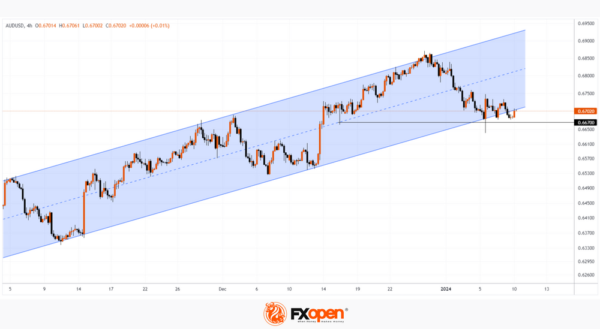Data today from the Australian Bureau of Statistics on Wednesday showed the monthly consumer price index (CPI) rose 4.3% year-on-year in November, the slowest pace since January 2022. Value a month earlier = 4.9%. Market forecasts = 4.4%.
This strengthened market expectations that interest rates would not have to rise further. Although the head of the Reserve Bank of Australia, Michele Bullock, warned of the risks of rising price pressures caused by domestic demand, for example, due to rising prices for rental housing.
Against the backdrop of the publication of news about inflation in Australia, no strong surges were noticed in the AUD/USD market. Perhaps this was due to the fact that there were no surprises.
Meanwhile, the 4-hour chart shows that the AUD/USD rate is nearing important support, which is formed by the lower line of the trend channel (shown in blue), within which the price has been moving since last fall.
Wherein:
→ in 2024, the price managed to push off from this line several times, but continued growth did not follow;
→ the highs of the days of January 4, 5 and 9 form a sequence of falling tops;
→ on January 5, prices broke through the low of December 15, but then rose sharply — a sign of demand below the level of 0.667.
Thus, the chart provides evidence to suggest that the forces of demand have enough capacity to prevent the price from falling, but are so exhausted that they cannot resume the upward trend in the blue channel.
It is possible that the AUD/USD market will trade in a restrained manner until the release of tomorrow’s inflation news in the US (16:30 GMT+3), which could lead to the formation of a new balance of supply and demand.
This article represents the opinion of the Companies operating under the FXOpen brand only. It is not to be construed as an offer, solicitation, or recommendation with respect to products and services provided by the Companies operating under the FXOpen brand, nor is it to be considered financial advice.

